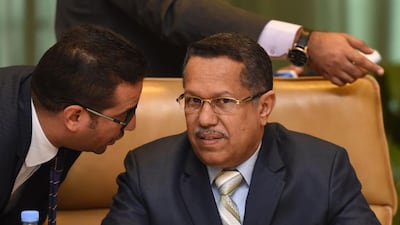Yemen will “not allow Iran a foothold in the country nor the room for the country to spread its philosophy of destruction”, prime minister Dr Ahmed bin Dagher has said, according to local media.
The Yemeni people, along with the Saudi-led coalition backing the government, will look to foil Iran’s plan to establish a presence in the country at the expense of Yemeni unity, Dr bin Dagher said on Sunday at a meeting in Aden with the commander of Saudi forces in the country, Brigadier Sultan bin Islam.
“Today it is our responsibility to liberate the remaining area controlled by the rebel militias," Dr bin Dagher added, referring to the Iran-backed Houthi rebels.
The first step to that victory, he said, was to liberate the southwestern city of Taez because it serves as a gateway to Yemen.
______________________
Read more:
Marriage of convenience between Yemen's Saleh and Houthis heads for bitter divorce
UAE says cracks in Yemen rebel alliance represent chance to break deadlock
Editorial: An end to the Houthi-Saleh alliance is long overdue
______________________
Iran has been providing weapons and military advisers to the Houthis who are fighting the Yemeni government of president Abdrabu Mansur Hadi alongside allied fighters.
In March, the arms tracking NGO Conflict Armament Research said Iran had transferred so-called kamikaze aerial drone technology to the Shiite rebels who had used it to disable missile defences belonging to the Saudi-led coalition backing the government.
In July, the US state department accused Iran's Quds Force, the elite branch of the Revolutionary Guard responsible for overseas military operations, of "playing a destabilising role in military conflicts in Iraq, Syria and Yemen".
The Houthis have formed a military and political alliance with former Yemeni president Ali Abdullah Saleh and renegade soldiers loyal to him. But cracks have emerged between the allies in the past month with Mr Saleh last week demanding the arrest of Houthi gunmen suspected of killing one of his top associates, Colonel Khaled Al Radi.
Fighting broke out in Sanaa between the Houthis and Saleh loyalists following the killing of Al Radi on August 26, with two Houthi fighters killed in the clashes.
The two sides agreed to ease tensions three days later but, although the fighting has now stopped, fighters from both sides remain deployed in backstreets and in some buildings of the capital.
The Houthis seized Sanaa in September 2014 before advancing south and seizing large swathes of the country. The Saudi-led coalition, which includes the UAE, intervened the following March in an effort to restore Mr Hadi's government to power in Sanaa and have since retaken much of the territory captured by the rebels and allied fighters.
The Houthis and Saleh loyalists continue to govern the capital and other areas in the north and west of the country, however.

